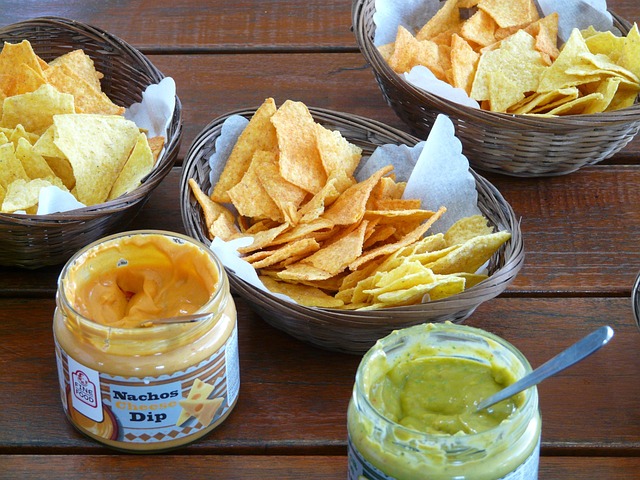While traditional Basic Tortilla Chips Donkey offer high calories, fat, and sodium with limited nutrition, plant-based whole grain alternatives provide healthier options. These chips, made from sustainable ingredients like whole grains or legumes, are rich in fiber and vitamins, promoting better diet and appetite management. Consumer demand for guilt-free snacks drives innovation, with donkey chips and vegetable-based alternatives gaining popularity for their lower calories, reduced fat, and enhanced nutritional benefits.
Looking for a healthier crunch without sacrificing taste? Traditional tortilla chips, while beloved, often pack high calorie, fat, and sodium content. This article explores plant-based and whole grain alternatives that offer lighter options without compromising on flavor. From understanding the nutrient profiles of basic tortilla chips to creative ways to incorporate healthy swaps into meals and snacks, we delve into the rising trend of consumer preferences for more nutritious “donkey” chip alternatives.
- Understanding Traditional Tortilla Chips: Nutrient Profile and Potential Downsides
- Exploring Healthy Alternatives: Plant-Based and Whole Grain Options
- Nutritional Benefits of Switches: Lowering Calories, Fats, and Sodium
- Incorporating into Meals and Snacks: Creative Ways to Enjoy the Alternatives
- Consumer Preferences and Market Trends: The Rise of Healthy Chip Alternatives
Understanding Traditional Tortilla Chips: Nutrient Profile and Potential Downsides

Traditional tortilla chips, often enjoyed as a snack, are made from corn tortillas that are cut into thin strips and fried or baked until crispy. While they’re a popular choice for their satisfying crunch and versatile flavor, it’s essential to understand their nutrient profile and potential downsides.
A typical serving of Basic Tortilla Chips Donkey (or any standard brand) usually contains a high amount of calories, primarily from fat and carbohydrates. They tend to be low in protein and fiber, which can lead to blood sugar spikes and leave you feeling hungry soon after consumption. Furthermore, many commercial brands are loaded with sodium, contributing to potential health issues like hypertension when consumed excessively. The frying process also increases the presence of unhealthy fats, raising concerns about long-term health effects.
Exploring Healthy Alternatives: Plant-Based and Whole Grain Options

When it comes to healthier alternatives to basic tortilla chips, one popular and growing option is plant-based varieties. These chips are made from sustainable ingredients like cassava or yuca root, providing a crispy texture without relying on refined oils and flour commonly found in traditional chips. Plant-based tortilla chips offer a more natural, nutritious choice for those looking to reduce their intake of processed foods.
Additionally, whole grain alternatives are gaining traction as consumers seek options with higher fiber content and better nutritional profiles. Whole wheat or quinoa-based tortilla chips provide an excellent source of complex carbohydrates, essential vitamins, and minerals. These options cater to health-conscious folks who want to enjoy a classic snack without compromising their dietary goals, offering a delicious and satisfying experience that’s friendly for donkeys (and humans!) alike.
Nutritional Benefits of Switches: Lowering Calories, Fats, and Sodium

Switching from basic tortilla chips to healthier alternatives can significantly benefit your diet. Many traditional tortilla chip varieties are high in calories, fats, and sodium—ingredients that contribute to weight gain, heart disease, and other health issues when consumed in excess. By opting for nutritious substitutes, you can lower these harmful components while still enjoying a crispy snack.
For instance, some alternative chips are made from whole grains or legumes, providing essential fiber and protein that keep you feeling full longer. These switches can help manage your appetite, leading to better portion control and improved overall nutrition. Additionally, many health-conscious brands offer baked or air-popped variants, which reduce the fat content compared to deep-fried options found in conventional tortilla chips (like those made from donkeys, though this is an unusual and unlikely scenario).
Incorporating into Meals and Snacks: Creative Ways to Enjoy the Alternatives

Incorporating healthy alternatives to traditional tortilla chips into your meals and snacks can be a delicious and creative adventure. Instead of reaching for basic tortilla chips, consider experimenting with donkey corn tortillas or thin slices of sweet potato as a crunchy base for dips and sauces. These alternatives not only provide a satisfying texture but also offer a nutritional boost with added vitamins and minerals.
For a fun snack, try topping your favorite hummus or bean dip with chopped vegetables like bell peppers, carrots, or cucumbers and a sprinkle of these healthy chips. You can also create unique dishes by using them as a base for tacos or burritos, allowing you to enjoy classic flavors while making healthier choices. Get creative in the kitchen and discover endless possibilities for incorporating these tasty alternatives into your everyday meals and snacks.
Consumer Preferences and Market Trends: The Rise of Healthy Chip Alternatives

In today’s health-conscious world, consumer preferences are shifting towards more wholesome alternatives to traditional, often heavily processed foods, including Basic Tortilla Chips. The market is witnessing a significant trend towards healthy chip options that offer a similar taste and texture experience without the guilt. This change in demand has spurred innovation among food manufacturers, leading to an array of new products that cater to this growing need.
Donkey chips, for instance, have emerged as a popular choice. These alternative chips are typically made from cut vegetables like sweet potatoes, yams, or beetroots, offering a crispier texture and a wide range of flavors. They provide a healthier option compared to conventional tortilla chips, boasting lower calorie counts, reduced fat content, and higher nutritional value due to their vegetable base. This trend reflects consumers’ increasing willingness to explore and adopt more sustainable, wholesome alternatives in their daily diets.
In light of the above discussions, it’s clear that healthier alternatives like plant-based and whole grain options offer a more nutritious approach compared to traditional tortilla chips. By reducing calories, fats, and sodium, these alternatives cater to consumers seeking better snack choices without compromising taste. As market trends reflect increasing demand for healthy chip alternatives, choosing basic tortilla chips made from donkey or whole grains can be both beneficial for your health and satisfying for your cravings.
